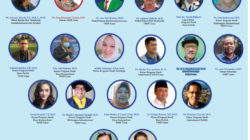Universitas Nasional as one of the oldest campuses in Indonesia that has majors in social and political sciences, organizes the International Conference on Social and Political Science (ICOSOP) II. The activity was held at the Cyber Unas Auditorium Building, Jakarta, Wednesday (26/10/2022).
“The implementation of ICOSOP II focuses on issues of mobility, cultural encounters, and social connections. This is an important part of the pattern of social relations, the formation of institutions, and new values of society,” said the Dean of the Faculty of Social and Political Sciences (FISIP) Unas, Dr. Erna Ermawati Chotim.
The theme, continued the Dean of FISIP Unas, departs from the reality of advances in digital technology and transportation in the 21st century to make geographical space that was previously an obstacle to cross-cultural and national encounters exceeded.
According to Erna, ICOSOP II is a regular activity of FISIP Unas which brings together lecturers and researchers to exchange ideas about the latest issues in the social sciences in the world. “This event is an event for FISIP Unas to get international recognition. This activity is a continuous activity that runs every year,” said Dr. Erna.
Next year, he continued, it is planned that similar activities will be held by designing strategic issues such as global geopolitical developments, the sustainability of the lives of 21st century urban communities, and the politics of citizenship.
Unas is one of the pioneers of higher education in Indonesia who initiated the social and political department in 1949. When this campus was established, it began with the name of the Faculty of Socioeconomics (FSEP), then evolved into the Faculty of Political Science (FIP) and the Faculty of Economics (FE).
At that time, at the University of Indonesia (UI) the name of the Faculty of Social Sciences (FIS) was used. Then the Ministry of Education and Culture combined the patterns of Unas and UI into FISIP which is now followed by other universities.
FISIP Unas, which has an A accreditation, now has five study programs, namely; political science, international relations, communication science, sociology, and public administration. Includes S2 and S3 political science, and S2 public administration. Next year will open S3 public administration. The S2 and S3 levels are under the umbrella of the Unas Graduate School.
According to the Chairman of the Committee, Dr. Andi Achdian, the implementation of the conference which lasted for one day was attended by 55 participants from various countries such as the United States, Germany, England, Malaysia, and Indonesia. Presenting invited speakers, panel participants, active participants.
Andi Achdian from the Center for Social and Political Studies (PKSP) FISIP Unas discussed the character of the main traits that shaped the development of human culture in the long course of history. “Cross-continental, cross-country, and cross-cultural mobility, however, has not received proper attention from social science researchers in Indonesia,” he said.
Professor. Dr. L. Ayu Sarasvati from the Department of Women, Gender, and Sexuality Studies, University of Hawai’i, in her presentation pointed out the important reality of “neoliberal logic” that gives birth to the condition that the more a person spends time on social media, the more distanced (disconnected) a person is.
“This reality gives a contrasting picture of the promising nature of social media (connectivity) mastered by neoliberal logic,” said Ayu Saraswati.
Dr. Timo Duille, a researcher from Bonn University, presented his idea of the inequality that arises in the process of cultural encounters. He reviewed the accusations of anti-Semitism from the German media against the theme of the exhibition held by Indonesian artists in the Documenta art exhibition.
“The issue of different historical experiences is the basis for the clash of discourses between the German media and Indonesian artists,” said Timo.
Prof. Dr. Aris Munandar said that the relationship between humans and nature is an important factor in the development of the tourism industry, waste management, and sustainable empowerment. The whole themes form a series of how mobility, cultural encounters, and connectivity are becoming an inevitable part of our social world.
“Social scientists are now faced with the reality of re-developing creative perspectives and methods of the social sciences in response to the development of the contemporary world now,” said the professor of FISIP Unas.
In addition, there is also Professor Dr. Datuk Shamsul Amri Baharuddin from the Institute of Ethnic Studies, The National University of Malaysia, Assoc Prof. Dr. TB Massa Djafar from Unas Graduate School, and Christoper Kelly, M.Sc from King’s College London, as well as several other speakers.
There are several sub-themes, such as Global Citizenship and Social Resilience, Women and the Internationalization of Work; Consequences of Cross-Border Mobility; Digital Technology and the Future of Democracy; Digital Diplomacy and the New Paradigm of International Relations; New Media and Public Policy, Hybridization of Identity and Cultural Ties; Digital Governance and Quality of Public Services; and Social Justice in Indonesian Cities. (*)




